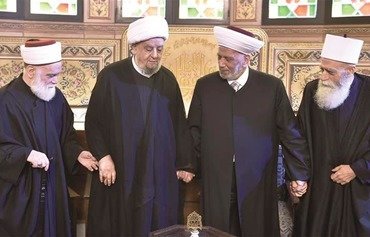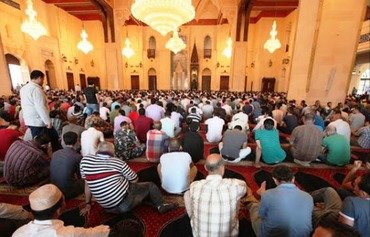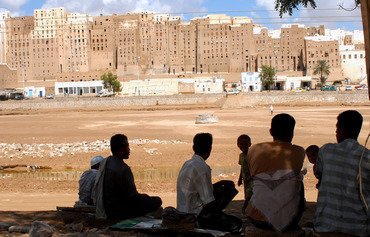More than 400 Lebanese Sunni clerics and scholars convened in the northern city of Tripoli to affirm their commitment to moderation and their rejection of extremism and violence.
Members of the Muslim Scholars Committee and others who attended the meeting at al-Wafaa mosque reaffirmed their support for the moderate directives of Dar al-Fatwa and Grand Mufti of Lebanon Abdul Latif Derian.
They stressed the need for efforts to restore the image of Islam, which has been tarnished by extremist groups purporting to operate in its name.
"The First Islamic Scholars Congress: Sunnis in Lebanon and the Choice of Moderation and Rejection of Extremism," was convened on February 19th at the invitation of Tripoli sharia judge Sheikh Samir Kamaluddin.
![Sunni clerics and scholars gather at Tripoli's al-Wafaa mosque to affirm their commitment to moderation and their rejection of extremism. [Photo courtesy of the meeting's preparatory committee]](/cnmi_am/images/2017/03/02/7376-lebanon-sunni-scholars-600_384.jpg)
Sunni clerics and scholars gather at Tripoli's al-Wafaa mosque to affirm their commitment to moderation and their rejection of extremism. [Photo courtesy of the meeting's preparatory committee]
Participants agreed that terrorism is not a sectarian act but rather a criminal act, regardless of the perpetrator, and deemed that anyone who engages in an act of violence, radicalism, extremism or oppression can be described as a terrorist.
They affirmed their rejection of extremism in the region, saying it is harming innocents, and their support for Dar al-Fatwa and Derian "for his role in fighting extremism and terrorism" and fostering national unity.
They also demanded that Sunni community leaders stand shoulder-to-shoulder to unify their voice and stance on these matters.
'Tripoli, city of diversity and openness'
It is significant that the meeting was held in Tripoli, said Sheikh Samer Shahood, who served on the meeting's preparatory committee and teaches sharia at Dar al-Fatwa.
The reputation of the Sunni majority city has been tarnished as it has been accused of "being a hub for radicalism and extremism", he told Al-Mashareq.
"We revealed, with the convening of the congress and the number of attendees, the true identity of the city, the city of diversity and openness," he said.
The timing of the congress also is significant "seeing as we live in a region sitting atop a volcano of radicalism, extremism and terrorism", Shahood said.
"The current situation does not convey the true image of Islam, especially as the voice of extremism rings the loudest," he added. "With our congress we said 'Yes, there is another voice rising, and it is our moderate voice'."
Proof that the voice of moderation has risen to counter the voice of extremism can be found in the diversity of the attendees, all of whom participated in laying foundations "that we hold as an honour code".
"All figures, religious authorities, the Muslim Scholars Committee, independent religious figures and more than 400 figures from all parts of Lebanon pledged that no one will speak in our name or force us to take a path that runs counter to the path of moderation," he said.
At present, he warned, "members of the Sunni community are being provoked by some partners in the homeland, causing some to lean towards extremism".
The conference was designed to ensure Sunni clerics and scholars are in accord, he said, as well as to "affirm that our strength is in our diversity".
'Our choice is moderation'
The meeting "shows the true image of Islam", said Sheikh Nabil Rahim, a member of the North Lebanon Muslim Scholars Committee.
There are some who see Islam, Muslims and terrorism as one and believe that Islam is behind all the acts of terrorism, he told Al-Mashareq.
"The all-inclusive congress was held to affirm our condemnation of terrorism, and to declare that our choice is moderation," he said.
Standing before hundreds of leading Islamic figures, Muslim scholars confirmed their concurrence with the positions discussed at the congress, the condemnation of extremism and commitment to moderation, Rahim said.
The recommendations put forth called for holding more congresses and taking practical steps to advocate moderation and fight extremism, he said, adding that these may include an increased focus on moderate Friday sermons.
Tripoli "is not an incubating environment for terrorism, despite the fact that some youth were misled with extremist ideology", he said. "They are a small percentage."
Putting Sunni affairs in order
The decision to convene the congress and bring together the number and variety of participants was an attempt "to put the affairs of the Muslim Sunni arena in order", said Qasim Qassir, a specialist in the affairs of Islamist groups.
This effort was undertaken against the backdrop of the rhetoric of extremism and violence that is roiling the region, he told Al-Mashareq.
The importance of the congress lies in the size of participation and the honest expression of positions and exchange of views among attendees, he said.
Participants described the problems they are facing and the anxiety the Sunni community feels over the growth of extremism at the expense of its reputation.
Similar meetings will follow, Qassir said, "with the aim of conveying a moderate Muslim stance".
The meeting "laid the foundation for a new phase and gave prominence to non-extremist positions that reassure the Sunni arena, Tripoli and Lebanon", he said.

![Muslim worshippers perform the evening (Isha) prayer during the holy fasting month of Ramadan on June 7th, 2016 outside al-Sadiq mosque in the Lebanese coastal city of Tripoli. [Benjamin Cremel/AFP]](/cnmi_am/images/2017/03/02/7375-lebanon-tripoli-mosque-600_384.jpg)







In the name of God, the Most Gracious, the Most Merciful. God’s peace be upon Muhammad and his family. God Almighty has said, “And strive for God, with the striving due to Him. He has chosen you, and has not burdened you in religion—the faith of your father Abraham. It is he who named you Muslims before, and in this. So that the Messenger may be a witness over you, and you may be witnesses over the people. So pray regularly, and give regular charity, and cleave to God. He is your Protector. What an excellent Protector, and what an excellent Helper.” (al-Hajj 78). When interpreting this verse, al-Nesaey said, “Hesham bin Ammar said that Mohammed Bin Shoaib said that Mouawya bin Sallam said that his brother Zain bin Sallam said that Abi Sallam told him that al-Hareth al-Ashaari said citing the Prophet (PBUH) said,” Whoever calls for jahiliyya shall be thrown into hell. A man said, o, Prophet, what if he fasts and prays, the Prophet said, ‘even if he fasts and prays. Invite him with the call for which you’ve been called Muslims as believers and worshipers of God.”
Reply1 Comment(s)